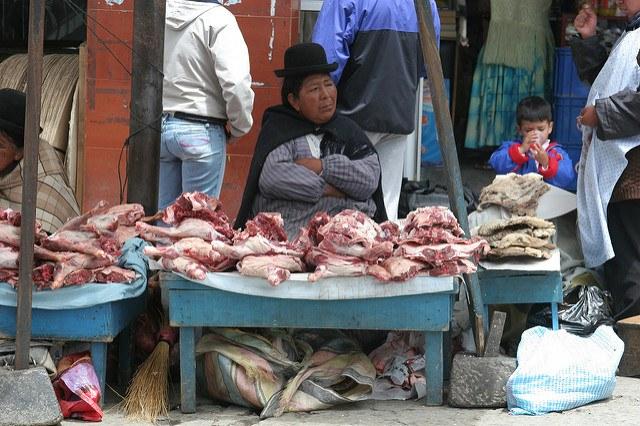
What is the best way to help developing communities and nations? Every philanthropist has an idea. There's Matt Damon of Water.org, who sees clean water and improved infrastructure as the basis for a resilient community. Mo Ibrahim demonstrated through his foundation that education is the basis for better governance in African countries. Santana helps enhance communication and cultural tolerance in the Middle East through the Milagro Foundation. And Rev. Lennox Yearwood, Jr started Hip Hop Caucus to draw attention to climate change and the environmental justice needs of society's poorest members.
And then there is Bill Gates and his Coop Dreams.
Last month Gates announced that he would partner with Heifer International to bring self-employment to some of the world's most impoverished, remote communities. His strategy admittedly may sound a bit odd in context to what we expect to hear from the founder of one of the world's top tech companies. Computers, cloud access, tech education, great. But chickens?
But that's not abnormal for Gates, who has focused much of his recent philanthropic efforts on global health initiatives and points out that a sustainable income is the first step to raising the quality of life for millions of people. And years of research backs up what he says. Improve the earning capacity of a family and you not only raise their access to better services and food, but you also improve their sense of self worth, which ultimately impacts their earning capacity.
In that context, handing out 100,000 chickens to poor communities sounds pretty brilliant.
"They're a good investment," Gates pointed out: five hens and a rooster, and you have a growing business. "Eventually, with a sale price of $5 per chicken — which is typical in West Africa — [the owner] can earn more than $1,000 a year, versus the extreme-poverty line of about $700 a year." Three hundred dollars more a year can mean a huge difference to a family struggling to afford food.
But what happens when one of the countries you earmarked for those chickens doesn't want the charity? And more specifically, what happens when a recipient takes exception to being called disadvantaged?
That's exactly the predicament that Gates and Heifer International faced recently when Bolivia, South America's fifth-largest nation, found itself on the goodwill list for a very large flock of chickens.
"I find it rude," explained Cesar Cocarico, Bolivia's rural development minister. "We don't depend on chickens. We've advanced. Our people have dignity, and they know how to work."
Cocarico has a point. The Bolivia of today is nothing like the Bolivia of the 1980s, when researchers flocked to the landlocked country to study ways to combat malnutrition and rampant poverty. The Union of South American Nations, whose treaty was signed in 2008, helped forge ties in commerce between the Americas' most southern neighbors -- creating the Americas' first successful version of a mini-EU. It also helped fortify political support against countries and companies that have historically paved a well-worn path into Latin American commercial interests.
Today, Bolivia boasts a booming chicken trade (by its standards) of almost 200 million chickens. More than 30 million are exported annually. So, it isn't hard to see why the Bolivian government may seem a bit touchy about its image.
"How can he think we are living 500 years ago, in the middle of the jungle not knowing how to produce?” Cocarico queried journalists last month. “Respectfully, he should stop talking about Bolivia."
But that doesn't mean that the Andean country doesn't have its problems with poverty or malnutrition. Although the nation has made huge strides to address poverty, illiteracy and malnutrition in its poorest communities, it still has a way to go. According to 2013 statistics, 1 in 3 children suffer from stunting (in size), a byproduct of malnutrition, reports the International Development Bank. According to the IDB, Bolivia has the second highest stunting rate in Latin America and the Caribbean.
"Poverty and lack of health systems that provide the right supplements are the most commonly cited reasons for the problem, but lack of awareness and behavioral issues related to nutrition are factors as well," the agency concluded. It also noted that today's Bolivian children actually have something in common with U.S. children: a diet rich in empty carbohydrates and poor nutritional choices like snacks and sugar.
But that still doesn't explain why as much as 45 percent of the country's population are below the poverty line (2012). According to the United Nations International Children's Emergency Fund (UNICEF), Bolivia's under-5 mortality rate still stands at 60 out of 1,000, with malnutrition and related complications like diarrhea remaining as the major causes of death. And no matter how distrustful the Bolivian government may be of Gates' offer, the fact is that researchers and aid agencies are still knocking on Bolivia's door. Chronic malnutrition is still a problem.
Perhaps Bolivia's biggest gripe isn't the chicken but the chatter: the fact that at the root of every resilient culture is self-pride and, admittedly, how it measures up with its neighbors. Cultural identity and national pride may seem like small issues when it comes to saving lives and boosting the global economy. But it's huge when considering the strides a country and its people have already made and the image they are willing to let others walk away with.
Image credits: 1) UK Department for Internal Development/Russell Watkins; 2) Flickr/3rdParty!
Jan Lee is a former news editor and award-winning editorial writer whose non-fiction and fiction have been published in the U.S., Canada, Mexico, the U.K. and Australia. Her articles and posts can be found on TriplePundit, JustMeans, and her blog, The Multicultural Jew, as well as other publications. She currently splits her residence between the city of Vancouver, British Columbia and the rural farmlands of Idaho.














